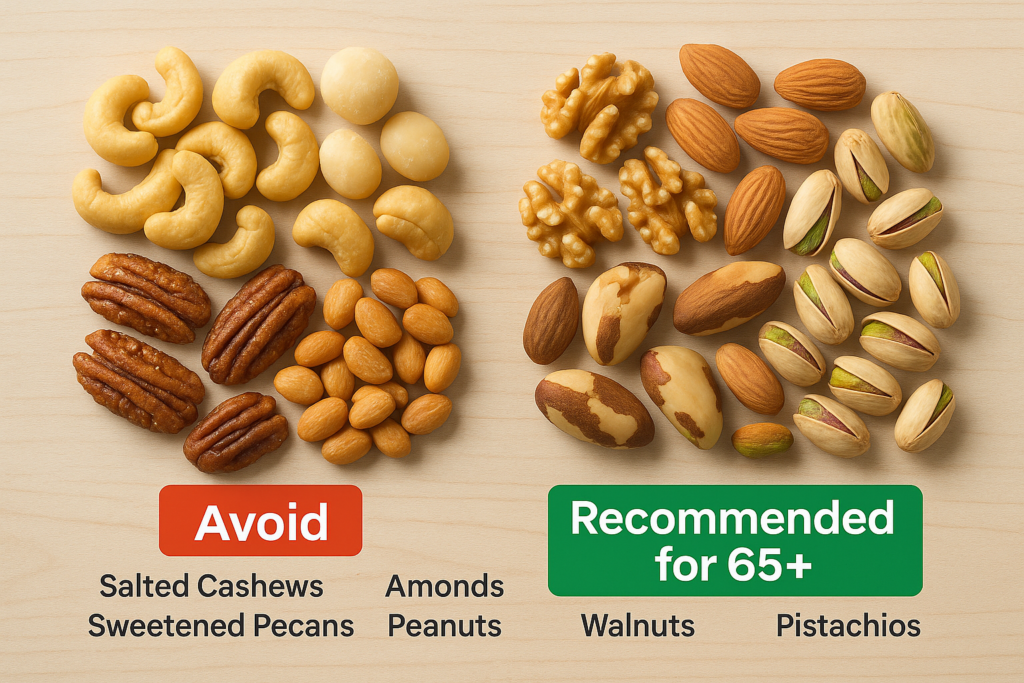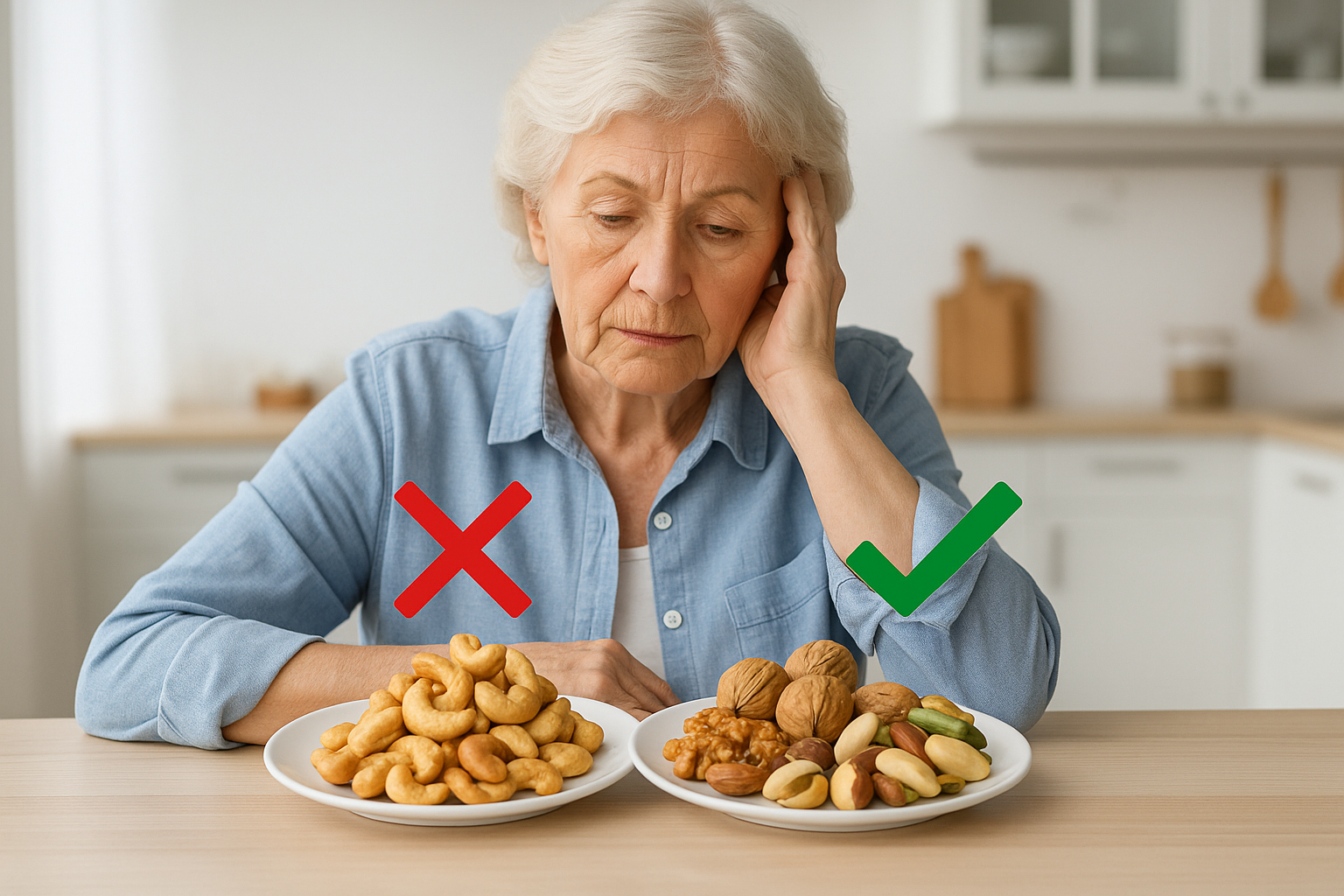Over 65? Avoid These 4 Nuts Immediately — And Eat These Instead
Nuts to avoid over 65 is a growing concern among geriatric nutrition experts. Although nuts are widely praised for their health benefits, some varieties may pose risks for people in their later years. After age 65, metabolism slows down, dietary restrictions increase, and chronic diseases become more common—demanding greater care with food choices.
People over 65 experience physiological changes that affect digestion, cholesterol regulation, and sodium sensitivity. Therefore, it’s essential to understand which foods, even generally healthy ones, may not be suitable at this stage of life. This includes certain types of nuts that, while nutritious, may contain substances or fat levels that increase the risk for the heart, kidneys, or digestive system.
In this article, we’ll highlight four types of nuts that should be avoided by people over 65, explain why they are problematic, and present healthier, safer alternatives. We’ll also provide tips on how to incorporate the recommended nuts into a daily diet for long-term well-being.
If you or someone you care about is over 65, read on. Avoiding these nuts can be a simple yet powerful step toward protecting long-term health.
Why People Over 65 Should Be Cautious With Certain Nuts
Food choices should be more thoughtful as we age. Nuts are rich in healthy fats, proteins, and essential micronutrients. However, some varieties may have characteristics that are harmful to older adults, particularly those with chronic conditions such as hypertension, kidney disease, high cholesterol, or digestive sensitivity.
In older adults, the body becomes less efficient at processing fats and sodium. Some nuts contain high levels of saturated fat, added sodium, or even anti-nutritional compounds that interfere with the absorption of minerals like calcium and iron. Additionally, sensitive digestion can make the gastrointestinal system more prone to irritation from heavier nuts.
Another concern is texture and hardness. Tougher nuts, if consumed excessively or inadequately chewed, can increase the risk of choking or cause dental issues, especially in people with dentures or weaker teeth.
Understanding which nuts to avoid isn’t about strict restriction—it’s about smart adaptation. By replacing risky nuts with more suitable options, older adults can still enjoy the nutritional benefits of nuts—safely.
4 Nuts to Avoid Over 65

Some nuts, although nutritious, can be risky for seniors. Below are four types that should be avoided or consumed with extreme caution:
1. Salted Cashews (or Roasted with Salt)
Salted or roasted cashews often contain excess sodium, contributing to high blood pressure—a serious risk for seniors with hypertension or kidney issues. The roasting process at high temperatures can also degrade healthy fats.
2. Macadamia Nuts
Macadamias are high in total fat and calories. While they contain some healthy monounsaturated fats, they are not ideal for older adults with cardiovascular issues or slower metabolism, as they can contribute to weight gain and cholesterol imbalance.
3. Sweetened or Glazed Pecans
Natural pecans can be healthy, but sugar-coated versions spike blood sugar levels. Seniors with type 2 diabetes or prediabetes should avoid these forms, as they promote glycemic instability.
4. Peanuts (especially roasted with oil or salt)
Technically a legume, peanuts are often treated like nuts. Processed peanuts are typically loaded with hydrogenated oils, excessive salt, and preservatives. They also carry a high risk of aflatoxin contamination, which can be toxic to the liver—especially concerning for older adults.
Healthy Nut Alternatives for Seniors
Fortunately, not all nuts are problematic. Some are especially beneficial for those over 65, offering key nutrients without the risks. Here are the top choices:
1. Walnuts (raw)
Walnuts are rich in omega-3 fatty acids, especially ALA, which support heart and brain health. They help reduce LDL cholesterol and support cognitive function—critical in preventing dementia.
2. Unsalted Almonds
Almonds are loaded with vitamin E, fiber, and magnesium. In their unsalted form, they support cardiovascular and digestive health while helping regulate blood sugar levels.
3. Brazil Nuts (in moderation)
Brazil nuts are incredibly rich in selenium, which boosts immunity and supports thyroid function. For seniors, just one nut per day is enough—excess can lead to toxicity.
4. Unsalted, Shelled Pistachios
Pistachios offer fiber, protein, and antioxidants. They’re great for eye health, muscle function, and satiety. They also support weight management when consumed in appropriate amounts.
Key Health Benefits of These Recommended Nuts
Heart Health
Walnuts, almonds, and pistachios contain unsaturated fats that lower LDL and raise HDL cholesterol. Their antioxidants reduce arterial inflammation, lowering the risk of heart disease.
Brain Function
Walnuts are rich in omega-3 ALA, which enhances brain performance and may prevent Alzheimer’s. Almonds also contribute with vitamin E, vital for memory and mental clarity.
Immune Support
Brazil nuts supply selenium, which boosts immune response and regulates thyroid activity. This is critical for seniors, whose immune systems are often less responsive.
Digestive Health
Almonds and pistachios contain dietary fiber, which supports regular bowel movements and blood sugar control—key in managing diabetes and preventing constipation.
How to Add Healthy Nuts to a Senior Diet

1. Ideal Daily Portions
- Walnuts: 3–5 pieces
- Almonds: up to 10
- Brazil nuts: 1 per day
- Pistachios: 15–20 pieces
2. Best Times to Eat
Morning (with breakfast), as a mid-morning or afternoon snack, or mixed into salads or yogurt. Avoid large portions before bed to prevent indigestion or reflux.
3. Proper Storage
Store nuts in airtight containers, away from light and moisture. Refrigeration helps preserve nutrients, especially in hot climates.
4. Avoid Processed Nut Mixes
Pre-made mixes often include added sugar, salt, and oils. Stick to raw or dry-roasted, unsalted varieties.
Conclusion: Make Smarter Choices, Live Better
Avoiding certain nuts after age 65 doesn’t mean giving up flavor or nutrition—it means adapting intelligently. Choosing safer alternatives promotes better health, longevity, and a more independent lifestyle.
Keep Learning:
Are you ignoring hidden symptoms of type 2 diabetes? Learn the signs and when to seek medical advice.
Check out this guide on type 2 diabetes symptoms
Want better sleep naturally? Discover the best foods to help you fall asleep faster and sleep deeper.
Explore these sleep-supporting foods
Recommended Reading:
What do experts say about nuts and aging?
Read the article at Harvard Health


No responses yet